高中英语语法讲解与练习动名词
英语语法专项:动名词用法讲解及练习(附答案)

你听过英文语法有动词(verb)、名词(noun);但你听过有动名词(gerund)吗?1. The girl is singing a song.2. The girl singing now is my sister.3. Singing is one of her hobbies(爱好).三个句子中都有singing。
第一个句子的singing是常见的现在进行式(Present Continuous),是说眼下正在做什么;第二个句子的singing是现在分词(Present Participle),它把sing这个动词转为形容词,但仍有动词的成份(哈哈,这么一说,要把你搞晕了吧:-) 。
关于分词,以后有空再谈OK?)。
好戏在后头,你看看第三个句子的singing到底是什么东东呀?原来就是我们的主角动名词(Gerund)了!憧矗瑂ing原本是个动词,可是现在它加上ing后,看来竟像是一个名词了。
一、名词性的动名词(Nominal Gerund)Nominal Gerund 可以加上定冠词(Definite article,如the)或不定冠词(Indefinite article,如a, an),其他可加在动名词前的还有如:my, this, some, any, all, no 等等。
举例如下:1. The mellow(愉快地) singing of the birds announces the coming of spring.(singing前加定冠词the及形容词mellow;coming 前加the)2. We knew the robber was near when we heard a faint rustling(沙沙声) in the bushes.(rustling 前加不定冠词a及形容词faint)从上面的例子可看出如何将一个动词转成名词;但它和真正的名词还是有区别的,那就是没有单数或复数之分。
高中英语语法系列动名词

高中英语语法系列动名词I .概说动名词( v + ing )是动词的另一种非谓语形式。
它在句中起名词作用,可单独或构成动名词短语在句中作主语( 1 ) , 表语( 2 ) ,定语(3)或宾语(4):(1)Writing headlines in English is not an easy job .(2)My job is teaching English .(3)He is preparing the opening speech.(4)I enjoy learning about new things.II.功能A .主语(5)Talking mends no holes .(6 ) Smoking may cause cancer .也可以在下列结构中作主语:( 6 ) It’s no use sending him over . It’s too late .( 7 ) It’s no good smoking .( 8 ) It’s a waste of time doing it .B . 表语( 9 ) The only thing that interests her is dancing .( 10 ) Seeing is believing . (= To see is to believe .)动名词和不定式都可以作主语和表语。
一般说来,在表示具体行为时,多用不定式;表示一般行为时,多用动名词。
有时两者可以互用。
( 11 ) Smoking is banned here .cf . It isn’t good for you to smoke so much .( 12 ) Their job is building houses .cf . Our task now is to finish our homework .C . 定语( 13 ) a swimming pool ; a walking stick ; a dining roomD . 宾语( 14 ) I enjoy working here very much .下面动词只能接动名词作宾语:mind , miss , enjoy , escape , excuse , imagine , practise , postpone , suggest , consider , admit , avoid , advise , allow , require , finish 等。
高中英语语法_动名词用法详解

is singing on the stage.
现在分词与动名词作定语的区别 现在分词单独做定语时,放在所修饰的名词 前 , 说明其修饰名词的动作,性质或特征,它与被修饰 的名词是逻辑上的主动关系,且可以转换成定语 从句;动名词做定语说明被修饰名词的功能或用 前, 途,一般是单个动名词,放在被修饰名词之___ 可以转换成for 短语,表示“供作...之用”。
b. Dustin Hoffman is famous for his role
acting as a woman. Compare ( 短语后置)
The girl singing on the stage is my sister.
The amusing play = the play that is amusing.
现在分词 具有adj.,adv.的特性
宾语 表语 定语 状语 宾补
√ ×
√ ×
√ √
√
×
× √
现在分 词
√
√
动名词 ; 做主语和宾语的肯定是_________ 现在分词 。 做状语和宾补的肯定是__________ Examples: 1)Seeing is believing. (动名词做主语和宾语) 2)Be careful while crossing the street. (现在分词做时间状语) 3)I heard her singing an English song when I passed by her room yesterddoing ②只接to do 动词+宾语 ③doing和to do皆可,意义 区别很大 ④doing和to do皆可,意义 区别不大
中学英语语法讲义:动名词

中学英语语法讲义:动名词一、概说动名词是非谓语动词的一种,它由动词原形加-ing构成,形式上与现在分词相同。
动名词除具有动词性质外,还具有名词的性质。
动名词在句中可用作主语、表语、宾语、定语、宾语补足语等,但不能用作谓语(故称动名词为非谓语动词)。
二、动名词的句法功能1. 用作主语Saving is getting. 节约即增收。
Finding work is difficult these days. 现今找工作可不容易。
Being lost can be a terrifying experience. 迷路有时很可怕。
注:动名词作主语时,有时可用it作形式主语。
如:It’s hard work climbing mountains. 爬山是费劲的事。
It’s fun being taken to the Zoo. 被带去逛动物园很有意思。
用it代替动名词作形式主语的两个常用句型:It’s no use saying any more about it. 再谈这事没有用。
Is it any good trying to explain? 试图作些解释有用吗?2. 用作表语My favorite sport is swimming. 我最喜欢的运动是游泳。
His job is looking after sheep. 他的任务是看羊。
Seeing is believing. 眼见为实。
注:不定式和动名词均可用作主语和表语,两者的区别是:动名词多指笼统的、抽象的概念,而不定式则多表示具体的、一次性的动作。
3. 用作宾语Excuse me for coming late. 对不起我来晚了。
Most students enjoy asking questions in English. 多数学生都喜欢用英语提问。
注:动词用作介词宾语时,通常只用动名词形式,而不用不定式形式,典型的例外是表示“除外”的except和but(它们后接动词作宾语时通常用不定式)。
高中英语语法讲解与练习之动名词
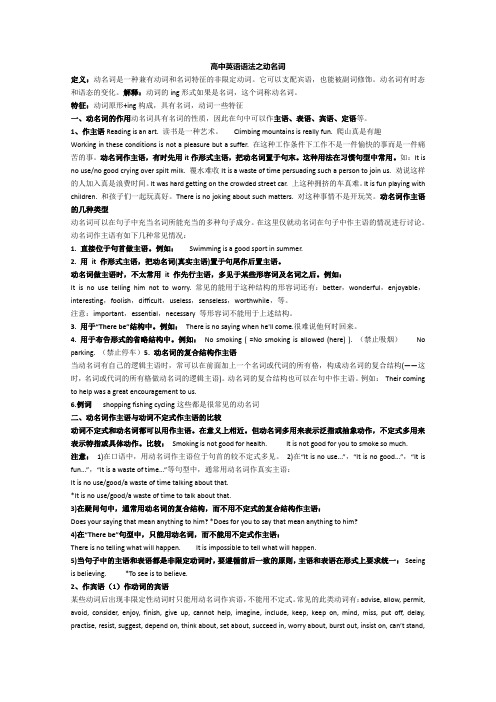
高中英语语法之动名词定义:动名词是一种兼有动词和名词特征的非限定动词。
它可以支配宾语,也能被副词修饰。
动名词有时态和语态的变化。
解释:动词的ing形式如果是名词,这个词称动名词。
特征:动词原形+ing构成,具有名词,动词一些特征一、动名词的作用动名词具有名词的性质,因此在句中可以作主语、表语、宾语、定语等。
1、作主语Reading is an art. 读书是一种艺术。
Climbing mountains is really fun. 爬山真是有趣Working in these conditions is not a pleasure but a suffer. 在这种工作条件下工作不是一件愉快的事而是一件痛苦的事。
动名词作主语,有时先用it作形式主语,把动名词置于句末。
这种用法在习惯句型中常用。
如:It is no use/no good crying over spilt milk. 覆水难收It is a waste of time persuading such a person to join us. 劝说这样的人加入真是浪费时间。
It was hard getting on the crowded street car. 上这种拥挤的车真难。
It is fun playing with children. 和孩子们一起玩真好。
There is no joking about such matters. 对这种事情不是开玩笑。
动名词作主语的几种类型动名词可以在句子中充当名词所能充当的多种句子成分。
在这里仅就动名词在句子中作主语的情况进行讨论。
动名词作主语有如下几种常见情况:1. 直接位于句首做主语。
例如:Swimming is a good sport in summer.2. 用it 作形式主语,把动名词(真实主语)置于句尾作后置主语。
动名词做主语时,不太常用it 作先行主语,多见于某些形容词及名词之后。
高中英语语法系列动名词讲义

动名词1 构成与特点动名词与现在分词同形,均由动词原形+ing构成。
动名词具有名词的特征,在句中可以作主语、宾语、表语和定语。
同时,动名词仍保留着动词的一些特征,可以带宾语和状语,并有完成式和被动语态。
1)动名词的否定式动名词的否定式由“not+动名词”构成。
He was criticized for not coming to class.他因没有来上课而受到批评。
She made her father angry by not taking his advice.她没有采纳她父亲的意见,使她父亲很生气。
He was scolded for not telling the truth.他因没说真话而挨了骂。
2)动名词的一般式动名词的一般式所表示的动作与谓语动词所表示的动作同时发生,或在谓语动词所表示的动作之后或之前发生,有时则表示一般性动作。
He loves talking with people.他喜欢跟人聊天。
(一般性)He is proud of being rich.他以富有为荣。
(同时)She is looking forward to seeing you again.她盼望着再次见到你。
(之后) I am confident of winning the match.我有信心赢得这场比赛。
(之后) Thank you for giving me so much help.谢谢你给我这么大的帮助。
(之前)3)动名词的完成式动名词的完成式表示的动作发生在谓语动词动作之前。
I'm not aware of having done wrong.我不知道自己做错了。
He denied having taken the money.他否认拿了钱。
He prided himself on having done good work.他以工作出色而感到自豪。
He was given a medal for having done excellent work.他因工作出色而获得了一枚奖章。
高中英语语法专题精讲精练-动名词综述
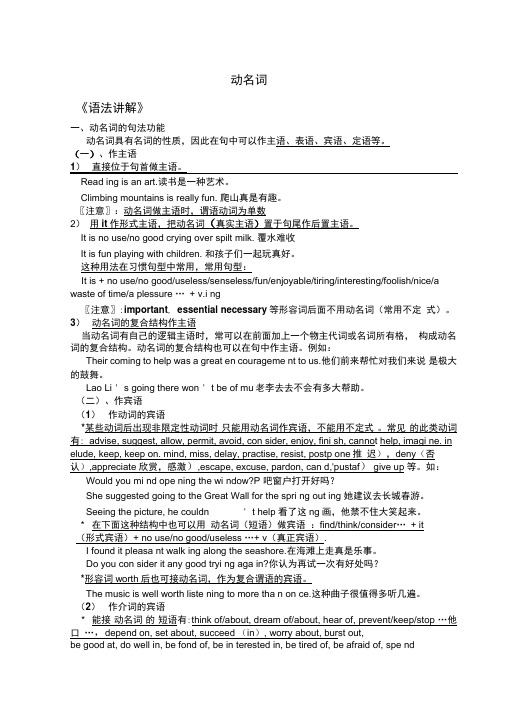
动名词《语法讲解》一、动名词的句法功能动名词具有名词的性质,因此在句中可以作主语、表语、宾语、定语等。
(一)、作主语1)直接位于句首做主语。
Read ing is an art.读书是一种艺术。
Climbing mountains is really fun. 爬山真是有趣。
〖注意〗:动名词做主语时,谓语动词为单数2)用it作形式主语,把动名词(真实主语)置于句尾作后置主语。
It is no use/no good crying over spilt milk. 覆水难收It is fun playing with children. 和孩子们一起玩真好。
这种用法在习惯句型中常用,常用句型:It is + no use/no good/useless/senseless/fun/enjoyable/tiring/interesting/foolish/nice/a waste of time/a plessure … + v.i ng〖注意〗:important, essential necessary等形容词后面不用动名词(常用不定式)。
3)动名词的复合结构作主语当动名词有自己的逻辑主语时,常可以在前面加上一个物主代词或名词所有格,构成动名词的复合结构。
动名词的复合结构也可以在句中作主语。
例如:Their coming to help was a great en courageme nt to us.他们前来帮忙对我们来说是极大的鼓舞。
Lao Li ' s going there won ' t be of mu老李去去不会有多大帮助。
(二)、作宾语(1)作动词的宾语*某些动词后出现非限定性动词时只能用动名词作宾语,不能用不定式。
常见的此类动词有: advise, suggest, allow, permit, avoid, con sider, enjoy, fini sh, cannot help, imagi ne. in elude, keep, keep on. mind, miss, delay, practise, resist, postp one推迟),deny(否认),appreciate 欣赏,感激),escape, excuse, pardon, can d,'pustaf) give up 等。
2022届高三英语一轮语法知识梳理之动名词的用法

2022年高考英语语法知识点讲解-动名词的用法动名词一、动名词的形式一、动名词的形式1.肯定式2.否定式(1)not doingNot being punctual makes him unreliable.不准时使人觉得他不可靠。
(2)not having doneI’m surprised at your not having noticed.你竟未注意到我感到吃惊。
(3)one’s not doingJenny’s not having been trained as a dancer is her one regret.杰妮没受过舞蹈的专业训练是她感到遗憾的事。
动名词二、动名词的句法作用二、动名词的句法作用1.作主语(1)动名词作主语时常用it作形式主语。
It is a waste of time doing ...做……是浪费时间It is no good doing ...做……是没好处It is no use doing ...做……是没用处It’s fun doing ...做……很有意思It is worth doing ...值得做……It doesn’t matter doing ...做……没有关系It is no good talking.空谈是没有用的。
It’s fun working for him.为他工作很有意思。
It’s no use crying over spilt milk.牛奶打翻了哭也没有用。
It is a waste of time doing such a thing.做这种事情是浪费时间。
It is worth discussing the problem.讨论这个问题是值得的。
It doesn’t matter wasting a little money.浪费一点钱没有关系。
【比较】①It was nice meeting you.见到你真高兴!(用于分别时)②It is nice to meet you.(用于刚刚见面时)(2)“There is no doing sth.” 句式中作主语,意为“不可能……,无法……”There’s no denying the fact.这一事实不容否认。
高一英语下学期期末考点专题讲解:专题10 重点语法复习 -- 动名词作主语和宾语 (解析版)

专题10 重点语法复习(动名词作主语和宾语)养成良好的答题习惯,是决定高考英语成败的决定性因素之一。
做题前,要认真阅读题目要求、题干和选项,并对答案内容作出合理预测;答题时,切忌跟着感觉走,最好按照题目序号来做,不会的或存在疑问的,要做好标记,要善于发现,找到题目的题眼所在,规范答题,书写工整;答题完毕时,要认真检查,查漏补缺,纠正错误。
总之,在最后的复习阶段,学生们不要加大练习量。
在这个时候,学生要尽快找到适合自己的答题方式,最重要的是以平常心去面对考试。
英语最后的复习要树立信心,考试的时候遇到难题要想“别人也难”,遇到容易的则要想“细心审题”。
越到最后,考生越要回归基础,单词最好再梳理一遍,这样有利于提高阅读理解的效率。
另附高考复习方法和考前30天冲刺复习方法。
动名词1. 基础知识动名词是非谓语动词的一种形式。
它既有动词的特征,又有名词的特征,故称动名词。
动名词也有时态和语态的变化,如表所示(以及物动词write为例),不及物动词没有语态的变化。
动词ing形式作主语通常表示抽象的或习惯性的动作。
也可用t作形式主语,动词-ing形式作真正的主语放在句末。
下列句型中常用动词-ing形式作主语:1. It is/was a waste (of...)/no use/no good doing sth.2. There is/was no sense/no point...(in) doing sth.It is no good coming before that.在那之前来没有用。
There is no sense(in)worrying about it now.现在大可不必为那件事忧虑。
特别注意:名师点津区分动词不定式及动词-ing形式作主语(1)动词-ing形式多表示一般的、抽象的、泛指的概念或一个已经完成了的动作,而不定式则表示具体的某一次行为或将来的动作,不过有时二者之间区别很小。
To look after these naughty boys is really difficult.照看这些淘气的男孩真是难。
高中英语动名词

高中英语动名词动名词是英语语法中的一个重要部分,也是高中英语中的一个重要知识点。
动名词是一种非谓语动词,它不仅可以作为动词使用,还可以作为名词使用,具有动词和名词的双重特性。
形式上与现在分词相同,以动词的-ing形式出现。
语法功能上与名词相同,可以作为主语、宾语、表语等。
动词的特性保留,可以带宾语、表语、状语等。
作为主语:动名词可以作为主语,表示一个动作或行为。
例如:Reading books is my favorite hobby.(读书是我的爱好。
)作为宾语:动名词可以作为动词的宾语,表示一个动作或行为。
例如:I enjoy reading books.(我喜欢读书。
)作为表语:动名词可以作为表语,表示一个状态或性质。
例如:My hobby is reading books.(我的爱好是读书。
)作为状语:动名词可以作为状语,表示一个动作或行为的原因、目的、方式等。
例如:I went to the library to read books.(我去了图书馆读书。
)在高中英语中,动名词的使用非常普遍,尤其是在阅读、写作、听力等题型中。
因此,掌握好动名词的用法对于提高英语成绩非常重要。
在学习动名词时,需要注意以下几点:注意区分动词和动名词:动名词是以动词的形式出现,但它是名词的性质,因此需要注意区分动词和动名词,避免混淆。
注意动名词的语法功能:动名词具有名词的语法功能,可以作为主语、宾语、表语等,但是它也保留了动词的特性,可以带宾语、表语、状语等。
因此需要注意动名词的语法功能,正确使用。
注意动名词的时态和语态:动名词的时态和语态与动词相同,需要注意其变化规则和用法。
注意动名词的搭配:动名词可以与许多词搭配使用,如介词、副词、连词等,需要注意其搭配用法。
动名词是高中英语中的一个重要知识点,掌握好其用法对于提高英语成绩非常重要。
在学习动名词时,需要注意其形式、语法功能、时态和语态、搭配等方面的特点和使用规则,多加练习,不断提高自己的英语水平。
高中英语语法讲解与练习之动名词与现在分词

动名词与现在分词的区别三、动名词的时态和语态动名词的时态和语态如下:主动语态、被动语态、一般式writing、being written、完成式having written、having been written其否定形式是在doing前加上not1、动名词一般式表示的动作通常是一般性动作,即不是明确地发生在过去、现在或将来的动作,或是与谓语动词所表示的动作同时发生的动作。
如:I hate talking with such people. 我讨厌与这样的人说话。
2、动名词的完成式表示的动作发生在谓语动词动作之前。
如:I don‟t remember having met him before.3、动名词的逻辑主语同时也是动名词动作的承受者,动名词用被动语态。
(1)它的一般式表示。
如:I don‟t like being laughed at in public. 在公共场合下,我不喜欢被别人嘲笑。
(2)它的完成式表示。
如:I am very pleased at your having been honored with a medal. 我很高兴你能获得这样的奖牌。
(3)在某些动词,我们常用动名词的一般式表示完成式,尽管动作发生在谓语动词动作之前,这似乎是一种强大的习惯。
如:Excuse me for being late. 我来晚了请你原谅。
I don‟t remember ever meeting somewhere. 我记不得原来在什么地方见过。
Thank you for giving us so much help. 谢谢给我们这么大的帮助。
(4)在多数情况下都避免使用动名词被动语态完成式,而用一般式代替,以免句子显得累赘,尤其是在口语中。
如:I forget once being taken (having been taken ) to the city zoo. 我曾被带到过这个动物园,可我忘了。
高中英语语法--动名词不定式讲解与练习

A) Complete the gaps using the gerund, to-infinitive or bare infinitive of theverbs in brackets .1. You should offer _______________ (get) her some professionaladvice.2. I wish _______________ (speak) about the problems that affectyoung people.3. You must _______________ (wake up) and _______________ (find)the right solutions for you.4. She insisted on _______________ (not hide) the problems you may_______________ (have) if you drink.Infinitive without to (bare infinitive)After modal verbs (except ought to) E.g.: Alcohol can hurt you.After had better and would rather. E.g.: I would rather not drive.With make and letE.g.: The glasses make them feel like they are drunk.GerundAfter prepositions E.g.: their friends died in a car accident afterhaving been drinking.After likes and dislikes verbs E.g.: He enjoys explaining what a TAD projectisAfter certain verbs: imagine, miss, forgive, suggest …E.g.: She suggested informing the students about the law.Infinitive with toAfter some adjectives: afraid, glad, sorry, happy, amazed, hard …E.g.: Mary was happy to hear her friend was out of danger.After certain verbs: agree, ask, decide, forget, help, learn, offer, prepare, want, wish ….E.g.: They decided to join the TAD.5.I don’t mind _______________ (drive) if you are tired.6.It´s hard _______________ (imagine) _______________ (go) through these difficultsituations.7.She agreed _______________ (take) her best friend to the association.8.After _______________ (fail) a breath test; you must _______________ (go) to thepolice station.9.He gave up _______________ (smoke) two weeks now.10.She insisted on not _______________ (tell) him the truth.11.They made him _______________ (listen) to their conversation.12.You can´t _______________ (come) in without _______________ (ask) permissionfirst.13.They wanted _______________ (become) experts in technology.14.Before _______________ (go) to bed you must _______________ (comb) your hair.15.Ann is so unfit that she can´t _______________ (touch) her toes without_______________ (bend) her knees.16.I don´t mind _______________ (get up) early.B)Finish the sentences below so that they have a similar a similar meaning tothe ones above.1.I went to the theatre and I liked it.I liked ______________________________________2.Would you like to keep me company?Are you interested in ___________________________3.You shouldn´t eat so many hamburgers.You had better ________________________________4.Being a good student is not difficult.It´s easy _____________________________________5.Mark was allowed to drink alcohol at the party.They let Mark __________________________________6.When I was 16 I was taught to drive.I learnt how ____________________________________C) Complete the gaps using the gerund, to-infinitive or bare infinitive of theverbs in brackets .17. You should offer _______________ (get) her some professionaladvice.18. I wish _______________ (speak) about the problems that affectyoung people.19. You must _______________ (wake up) and _______________ (find)the right solutions for you.Infinitive without to (bare infinitive)After modal verbs (except ought to) E.g.: Alcohol can hurt you.After had better and would rather. E.g.: I would rather not drive.With make and letE.g.: The glasses make them feel like they are drunk.GerundAfter prepositions E.g.: their friends died in a car accident afterhaving been drinking.After likes and dislikes verbs E.g.: He enjoys explaining what a TAD projectisAfter certain verbs: imagine, miss, forgive, suggest …E.g.: She suggested informing the students about the law.Infinitive with toAfter some adjectives: afraid, glad, sorry, happy, amazed, hard …E.g.: Mary was happy to hear her friend was out of danger.After certain verbs: agree, ask, decide, forget, help, learn, offer, prepare, want, wish ….E.g.: They decided to join the TAD.20.She insisted on _______________ (not hide) the problems you may _______________(have) if you drink.21.I don’t mind _______________ (drive) if you are tired.22.It´s hard _______________ (imagine) _______________ (go) through these difficultsituations.23.She agreed _______________ (take) her best friend to the association.24.After _______________ (fail) a breath test; you must _______________ (go) to thepolice station.25.He gave up _______________ (smoke) two weeks now.26.She insisted on not _______________ (tell) him the truth.27.They made him _______________ (listen) to their conversation.28.You can´t _______________ (come) in without _______________ (ask) permissionfirst.29.They wanted _______________ (become) experts in technology.30.Before _______________ (go) to bed you must _______________ (comb) your hair.31.Ann is so unfit that she can´t _______________ (touch) her toes without_______________ (bend) her knees.32.I don´t mind _______________ (get up) early.D)Finish the sentences below so that they have a similar a similar meaning tothe ones above.7.I went to the theatre and I liked it.I liked ______________________________________8.Would you like to keep me company?Are you interested in ___________________________9.You shouldn´t eat so many hamburgers.You had better ________________________________10.Being a good student is not difficult.It´s easy _____________________________________11.Mark was allowed to drink alcohol at the party.They let Mark __________________________________12.When I was 16 I was taught to drive.I learnt how ____________________________________。
高中英语语法一轮复习 第八讲非谓语动词(1)----动名词和分词用法讲解与练习
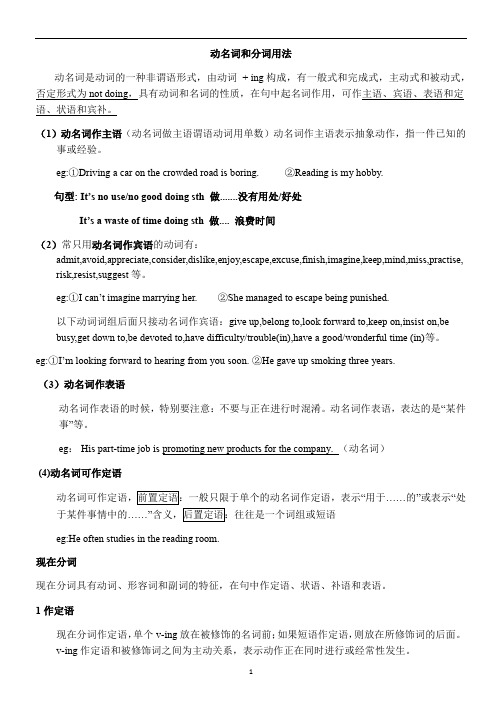
动名词和分词用法动名词是动词的一种非谓语形式,由动词+ ing构成,有一般式和完成式,主动式和被动式,否定形式为not doing,具有动词和名词的性质,在句中起名词作用,可作主语、宾语、表语和定语、状语和宾补。
(1)动名词作主语(动名词做主语谓语动词用单数)动名词作主语表示抽象动作,指一件已知的事或经验。
eg:①Driving a car on the crowded road is boring. ②Reading is my hobby.句型: It’s no use/no good doing sth 做.......没有用处/好处It’s a waste of time doing sth 做.... 浪费时间(2)常只用动名词作宾语的动词有:admit,avoid,appreciate,consider,dislike,enjoy,escape,excuse,finish,imagine,keep,mind,miss,practise, risk,resist,suggest等。
eg:①I can’t imagine marrying her. ②She managed to escape being punished.以下动词词组后面只接动名词作宾语:give up,belong to,look forward to,keep on,insist on,be busy,get down to,be devoted to,have difficulty/trouble(in),have a good/wonderful time (in)等。
eg:①I’m looking forward to hearing from you soon. ②He gave up smoking three years.(3)动名词作表语动名词作表语的时候,特别要注意:不要与正在进行时混淆。
动名词作表语,表达的是“某件事”等。
英语语法:动名词的详细分析讲解

英语语法:动名词的详细分析讲解1. 动名词概说动名词既具有动词的性质,又具有名词的性质,因此叫动名词。
①动名词的动词性质表现在,它可以和宾语或状语组成动名词短语如:My job is arranging the agenda for my boss.我的工作是为老板安排日程。
I finished the project in a month by working overtime.我靠加班在一个月内做完了这个项目。
②动名词的名词性质表现在,它可以在句巾用作主语、宾语等如:Studying abroad can be a good experience.留学是一种很好的经历。
(作主语)I regret telling her the truth.我后悔告诉她事实真相了。
(作宾语)2. 动名词的形式和特征动名词由“动词原形do+ - ing”构成。
动名词有以下时态与语态的变化:①动名词的一般式1)一般式所表示的动作和谓语动词的动作同时发生,表示经常性、习惯性的动作(或状态),也可能在谓语动词表示的动作之后发生。
I enjoy skiing in nature.我享受在大自然中滑雪。
(enjoy与skiing同时发生)He insisted on going with us.他坚持跟我们一起去。
(going发生在insisted on之后)2)有的动名词所表示的动作发生在谓语动词表示的动作之前,如:We don't remember reading the article before.我们不记得以前看过这篇文章了。
(reading发生在remember之前)They will never forget running into the super model in the mall.他们永远不会忘记在商场里偶遇那位超模。
(running into发生在forget之前)②动名词的完成式动名词的完成式表示的动作发生在谓语动词表示的动作之前。
高中英语2024届高考考点讲解与练习(非谓语动词作定语+非谓语动词作状语+非谓语动词作宾语补足语)

高考英语语法考点讲解与练习一、非谓语动词作定语【知识要点】1、非谓语动词包括四种:-to do不定式,-ing分词,-ed分词和动名词。
(重点为前三种)2、非谓语动词的词性及句法功能①-to do不定式相当于名词、形容词和副词,可以在句子中充当主语、宾语、表语、定语、状语和宾语补足语;②-ing分词相当于形容词和副词,可以在句子中充当表语、定语、状语和宾语补足语;③-ed分词相当于形容词和副词,可以在句子中充当表语、定语、状语和宾语补足语;④动名词相当于名词,可以在句子中充当主语、宾语、表语和定语。
3、前三种非谓语动词的形式与意义① -ing分词的基本意义为:主动或进行,变形有:进行式:doing被动式:being done完成式:having done完成被动式:having been done②-to do不定式的基本意义为:主动将来,变形有:进行式:to be doing被动式:to be done完成式:to have done完成被动式:to have been done③-ed分词表示被动或完成。
4、非谓语动词作定语由于三种非谓语动词都具有形容词的性质,所以它们都可以在句子中充当定语,并根据其在被修饰的名词中心词的前后位置,分为前置定语和后置定语两种。
the falling leaves (-ing分词作前置定语,“正在下落的叶子”)the leaves falling in the sky (-ing分词短语作后置定语,“正在空中下落的叶子”)the coming/following day (-ing分词作前置定语,“第二天”)the day to come (-to do分词短语作后置定语,“第二天”)the fallen leaves (-ed分词作前置定语,“已经落地的叶子/落叶”)the house burnt to the ground (-ed分词短语作后置定语,“被烧成废墟的房子”)【练习】单句语法填空1.Looking at the ______ (fall) leaves in the sky, he knows the fall is coming.2.Seeing the ______ (fall) leaves on the ground, he decided to do some sweeping first before sitting down to have a rest.3.It is said that the building ______ (build) here next year will be completed within one year.4.It is said that the building ______ (build) here now will be completed within one year.5.It is said that the building ______ (build) here last year will be rebuilt soon.6.The gentleman ______ (seat) next to Tom is his best friend.7.The gentleman ______ (sit) next to Tom is his best friend.8.The room was in a mass, with those ______ (break) furniture.9.The purely white snow looks like a beautiful blanket ______ (cover) the land.10.The police have got enough evidence ______ (prove) that he is guilty.11.Turn to the right and you will see a wide road ______ (lead) up to the building.12.If you get the first place, you will win an all expenses ______ (pay) journey.13.All the ______ (question) people supported the government’s latest policy.14.You should keep well the books ______ (borrow) from the library.15.Can those people ______ (seat) at the back hear me?二、非谓语动词作状语【知识要点】非谓语动词作状语由于三种非谓语动词都具有副词的性质,所以它们都可以在句子中充当状语。
高中英语高考语法动名词
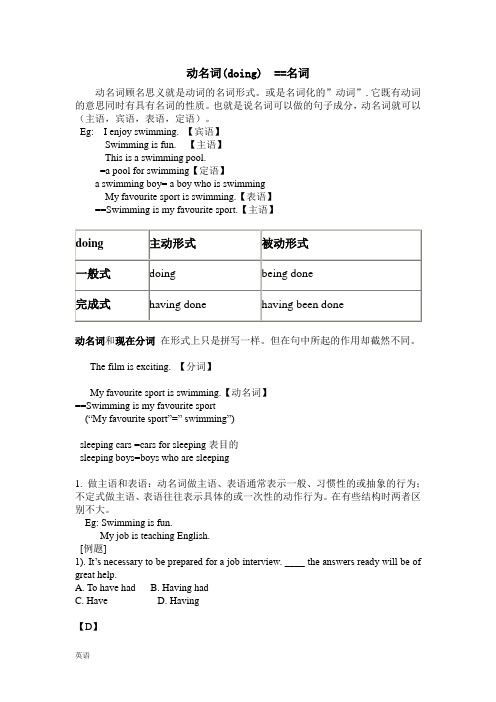
动名词(doing) ==名词动名词顾名思义就是动词的名词形式。
或是名词化的”动词”.它既有动词的意思同时有具有名词的性质。
也就是说名词可以做的句子成分,动名词就可以(主语,宾语,表语,定语)。
Eg: I enjoy swimming. 【宾语】Swimming is fun. 【主语】This is a swimming pool.=a pool for swimming【定语】a swimming boy= a boy who is swimmingMy favourite sport is swimming.【表语】==Swimming is my favourite sport.【主语】动名词和现在分词在形式上只是拼写一样。
但在句中所起的作用却截然不同。
The film is exciting. 【分词】My favourite sport is swimming.【动名词】==Swimming is my favourite sport(“My favourite sport”=” swimming”)sleeping cars =cars for sleeping表目的sleeping boys=boys who are sleeping1. 做主语和表语:动名词做主语、表语通常表示一般、习惯性的或抽象的行为;不定式做主语、表语往往表示具体的或一次性的动作行为。
在有些结构时两者区别不大。
Eg: Swimming is fun.My job is teaching English.[例题]1). It’s necessary to be prepared for a job interview. ____ the answers ready will be of great help.A. To have hadB. Having hadC. HaveD. Having【D】2). The president would attend the meeting himself,_____ gave them a great deal of encouragement.A. The president would attendB. The president to attendC. The president attendedD. The president’s attending【D】3) How about the two of us ___ a walk down the garden?A. to takeB. takeC. takingD. will take【C】* 动名词的动作发出者如何表示?①Would you mind my/me opening the window?② I can’t imagine my best friend/my best friend’s laughing at my work.I suggest Tom/tom’s coming early.I suggest that he should come early.T he president’s attending the meeting himself gave them a great deal of encouragement.That the president attended the meeting himself gave them a great deal of encouragement.It is dangerous for children to swim alone.I open the door to come in.I open the door for them to come in.不定式的逻辑主语用for 引出It was a great deal of encouragement to them for the president to attend the meeting himself.2. 作宾语:常跟动名词做宾语的动词和短语有:avoid, understand, appreciate, enjoy, imagine, mind, admit, practise, suggest, consider(考虑), delay, keep, allow, permit, forbid, look forward to , can’t help(情不自禁),be/get /become used to(习惯于) , devote… to , lead to[例题]4). It is difficult to imagine his ___ the decision without any consideration.A. acceptB. acceptingC. to acceptD. accepted【B】5). I can’t stand ___ with Jane in the same office. She just refuses ___ talking while she works.A.working; stoppingB. to work; stoppingC. working; to stopD. to work; to stop【C】动名词常见考点:①动名词的实质就是名词化的动词。
高考英语语法讲解:动名词
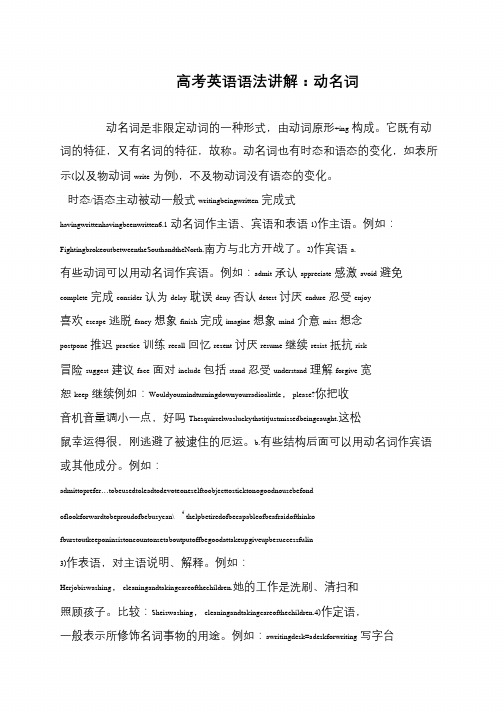
高考英语语法讲解:动名词动名词是非限定动词的一种形式,由动词原形+ing构成。
它既有动词的特征,又有名词的特征,故称。
动名词也有时态和语态的变化,如表所示(以及物动词write为例),不及物动词没有语态的变化。
时态/语态主动被动一般式writingbeingwritten完成式havingwrittenhavingbeenwritten6.1动名词作主语、宾语和表语1)作主语。
例如:FightingbrokeoutbetweentheSouthandtheNorth.南方与北方开战了。
2)作宾语a.有些动词可以用动名词作宾语。
例如:admit承认appreciate感激avoid避免complete完成consider认为delay耽误deny否认detest讨厌endure忍受enjoy喜欢escape逃脱fancy想象finish完成imagine想象mind介意miss想念postpone推迟practice训练recall回忆resent讨厌resume继续resist抵抗risk冒险suggest建议face面对include包括stand忍受understand理解forgive宽恕keep继续例如:Wouldyoumindturningdownyourradioalittle,please?你把收音机音量调小一点,好吗Thesquirrelwasluckythatitjustmissedbeingcaught.这松鼠幸运得很,刚逃避了被逮住的厄运。
b.有些结构后面可以用动名词作宾语或其他成分。
例如:admittoprefer…tobeusedtoleadtodevoteoneselftoobjecttosticktonogoodnousebefond oflookforwardtobeproudofbebusycan\‘thelpbetiredofbecapableofbeafraidofthinko fburstoutkeeponinsistoncountonsetaboutputoffbegoodattakeupgiveupbesuccessfulin 3)作表语,对主语说明、解释。
英语语法动名词讲解及练习
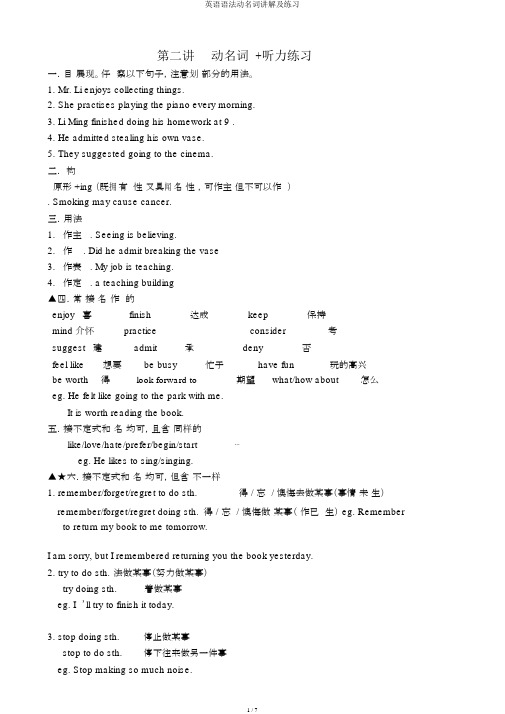
第二讲动名词 +听力练习一.目展现。
仔察以下句子,注意划部分的用法。
1.Mr. Li enjoys collecting things.2.She practises playing the piano every morning.3.Li Ming finished doing his homework at 9 .4.He admitted stealing his own vase.5.They suggested going to the cinema.二.构原形 +ing (既拥有性又具闻名性,可作主但不可以作). Smoking may cause cancer.三.用法1.作主 . Seeing is believing.2.作 . Did he admit breaking the vase3.作表 . My job is teaching.4.作定 . a teaching building▲四.常接名作的enjoy喜finish达成mind 介怀practicesuggest建admit承feel like想要be busy忙于be worth得look forward tokeep保持consider考deny否have fun玩的高兴期望what/how about怎么eg. He felt like going to the park with me.It is worth reading the book.五.接不定式和名均可,且含同样的like/love/hate/prefer/begin/start⋯eg. He likes to sing/singing.▲★六.接不定式和名均可,但含不一样1. remember/forget/regret to do sth.得/忘/懊悔去做某事(事情未生)remember/forget/regret doing sth.得/忘/懊悔做某事(作已生)eg. Remember to return my book to me tomorrow.I am sorry, but I remembered returning you the book yesterday.2.try to do sth.法做某事(努力做某事)try doing sth.着做某事eg. I ’ll try to finish it today.3. stop doing sth.停止做某事I was tired, let’s stop to have a rest.’t help doing sth.忍不住去做某事can’ t help to do sth.不可以帮助去做某事eg. He can ’t help crying when he heard the bad news.The medicine can ’t help to get rid of your cold.on doing sth.持续做同一件事情go on to do sth.持续做此外一件事情eg. I went on working all the night.He went on doing his homework after finish eating supper.★七.动名词用主动形式表被动含义doing ,含义相need/want/require三个表示“需要”的动词后既可接to do,也可接同,接 doing时是用主动式表被动含义。
高中英语语法动名词

高中英语语法动名词一. 概念动名词由动词原形+ING构成,是一种非谓语动词形式二. 相关知识点精讲:1.作主语。
例如:Fighting broke out between the South and the North. 南方与北方开战了。
2.作宾语a. 有些动词可以用动名词作宾语。
例如:admit 承认appreciate 感激avoid 避免complete完成consider认为delay 耽误deny 否认detest 讨厌endure 忍受enjoy 喜欢escape 逃脱fancy 想象finish 完成imagine 想象mind 介意miss 想念postpone推迟practice 训练recall 回忆resent 讨厌resume 继续resist 抵抗risk 冒险suggest 建议face 面对include 包括stand 忍受understand 理解forgive 宽恕keep 继续例如:Would you mind turning down your radio a little, please? 你把收音机音量调小一点,好吗The squirrel was lucky that it just missed being caught. 这松鼠幸运得很,刚逃避了被逮住的厄运。
b. 有些结构后面可以用动名词作宾语或其他成分。
例如:admit to prefer,to be used to lead to devoteoneself toobject to stick to no good no use be fond of look forwardtobe proud ofstick to no good no use be fond of look forwardtobe proud of be busy can't help be tired of be capableofbe afraid of think ofburst out keep on insist on count on set aboutput off be good at take up give up be successfulin3.作表语,对主语说明、解释。
2025届高三英语一轮复习语法讲解(动名词)及练习讲义

高三英语语法讲解及练习动名词第一部分知识透析第一节动名词的基本形式主动被动1. 一般式(not) doing(not) being done(常用来泛指一个动作,没有特别的时间意义,有时也可以表示在谓语动词之前或之后发生的动作)Swimming is her favorite sport.Learning to use electronic products is necessary in modern society.I remembered sending him an e-mail last week.He suggested taking my daughter to the zoo the next Sunday.I can’t stand being kept waiting.His not coming made everyone very disappointed.2. 完成式(not) having done(not) having been done(动名词的动作在谓语动词的动作之前发生)1 really regretted having missed such a wonderful musical.He denied having cheated in the exam.I heard of his having been chosen to be the coach of the team.I remember not having returned the book to the library.第二节动名词的用法1. 动名词作主语/表语动名词作主语/表语表示泛指的经常性的事情Collecting information is very important to businessmen.My hobby is collecting stamps.One of my bad habits is biting nails.2. 动名词作宾语1)一些动词后面只能跟动名词作宾语,如:ban consider delay deny escapefeel like finish forbid involve appreciate keep practise recommend quit suggestadmit permit avoid enjoy mentionimagine include mind miss resistRisk prohibit allow advise encourage dislike forgive advocate postpone fancyHe denied having been there.We enjoy walking along the Bund.Don’t risk going to the forest alone.The old should avoid eating oily food.注意:allow, advise,encourage,forbid, permit,recommend 后接动名词作宾语,接不定式作补语。
- 1、下载文档前请自行甄别文档内容的完整性,平台不提供额外的编辑、内容补充、找答案等附加服务。
- 2、"仅部分预览"的文档,不可在线预览部分如存在完整性等问题,可反馈申请退款(可完整预览的文档不适用该条件!)。
- 3、如文档侵犯您的权益,请联系客服反馈,我们会尽快为您处理(人工客服工作时间:9:00-18:30)。
高中英语语法之动名词定义:动名词是一种兼有动词和名词特征的非限定动词。
它可以支配宾语,也能被副词修饰。
动名词有时态和语态的变化。
解释:动词的ing形式如果是名词,这个词称动名词。
特征:动词原形+ing构成,具有名词,动词一些特征一、动名词的作用动名词具有名词的性质,因此在句中可以作主语、表语、宾语、定语等。
1、作主语Reading is an art. 读书是一种艺术。
Climbing mountains is really fun. 爬山真是有趣Working in these conditions is not a pleasure but a suffer. 在这种工作条件下工作不是一件愉快的事而是一件痛苦的事。
动名词作主语,有时先用it作形式主语,把动名词置于句末。
这种用法在习惯句型中常用。
如:It is no use/no good crying over spilt milk. 覆水难收It is a waste of time persuading such a person to join us. 劝说这样的人加入真是浪费时间。
It was hard getting on the crowded street car. 上这种拥挤的车真难。
It is fun playing with children. 和孩子们一起玩真好。
There is no joking about such matters. 对这种事情不是开玩笑。
动名词作主语的几种类型动名词可以在句子中充当名词所能充当的多种句子成分。
在这里仅就动名词在句子中作主语的情况进行讨论。
动名词作主语有如下几种常见情况:1. 直接位于句首做主语。
例如:Swimming is a good sport in summer.2. 用it 作形式主语,把动名词(真实主语)置于句尾作后置主语。
动名词做主语时,不太常用it 作先行主语,多见于某些形容词及名词之后。
例如:It is no use telling him not to worry.常见的能用于这种结构的形容词还有:better,wonderful,enjoyable,interesting,foolish,difficult,useless,senseless,worthwhile,等。
注意:important,essential,necessary 等形容词不能用于上述结构。
3. 用于“There be”结构中。
例如:There is no saying when he'll come.很难说他何时回来。
4. 用于布告形式的省略结构中。
例如:No smoking ( =No smoking is allowed (here) ). (禁止吸烟)No parking. (禁止停车)5. 动名词的复合结构作主语当动名词有自己的逻辑主语时,常可以在前面加上一个名词或代词的所有格,构成动名词的复合结构(——这时,名词或代词的所有格做动名词的逻辑主语)。
动名词的复合结构也可以在句中作主语。
例如:Their coming to help was a great encouragement to us.6.例词shopping fishing cycling这些都是很常见的动名词二、动名词作主语与动词不定式作主语的比较动词不定式和动名词都可以用作主语。
在意义上相近。
但动名词多用来表示泛指或抽象动作,不定式多用来表示特指或具体动作。
比较:Smoking is not good for health. It is not good for you to smoke so much.注意:1)在口语中,用动名词作主语位于句首的较不定式多见。
2)在“It is no use...”,“It is no good...”,“It is fun...”,“It is a waste of time...”等句型中,通常用动名词作真实主语:It is no use/good/a waste of time talking about that.*It is no use/good/a waste of time to talk about that.3)在疑问句中,通常用动名词的复合结构,而不用不定式的复合结构作主语:Does your saying that mean anything to him? *Does for you to say that mean anything to him?4)在“There be”句型中,只能用动名词,而不能用不定式作主语:There is no telling what will happen. It is impossible to tell what will happen.5)当句子中的主语和表语都是非限定动词时,要遵循前后一致的原则,主语和表语在形式上要求统一:Seeing is believing. *To see is to believe.2、作宾语(1)作动词的宾语某些动词后出现非限定性动词时只能用动名词作宾语,不能用不定式。
常见的此类动词有:advise, allow, permit, avoid, consider, enjoy, finish, give up, cannot help, imagine, include, keep, keep on, mind, miss, put off, delay, practise, resist, suggest, depend on, think about, set about, succeed in, worry about, burst out, insist on, can’t stand, be used to, get used to, devote…to…, look forward to, pay attention to, get down to,escape 等。
如:They went on walking and never stopped talking. 他们继续走,说个不停。
I found it pleasant walking along the seashore. 在海滩上走真是乐事。
Mark often attempts to escape being fined whenever he breaks traffic regulations.每当马克违反交通规则时,他常常企图逃避罚款的处分。
(2)作介词的宾语We are thinking of making a new plan for the next term. 我们正考虑为下学期制定新的计划。
Shall we have a rest or get down to doing our work? 我们休息呢还是开始干活?(3)作形容词的宾语The music is well worth listening to more than once. 这种曲子很值得多听几遍。
We are busy preparing for the coming sports meet. 我们正为马上到来的运动会忙着做准备。
3、作表语动名词作表语时句子主语常是表示无生命的事物的名词或what引导的名词性从句。
表语动名词与主语通常是对等的关系,表示主语的内容,主语、表语可互换位置。
Your task is cleaning the windows. 你的任务就是擦窗户。
(Cleaning the windows is your task.) What I hate most is being laughed at. 我最痛恨的就是被别人嘲笑。
(Being laughed at is what I hate most.)4、作定语动名词作定语往往表示被修饰词的某种用途。
如:a walking stick =a stick for walking=a stick which is used for walkinga washing machine=a machine for washing=a machine which is used for washinga reading room=a room for reading=a room which is used for readinga measuring tape=a tape for measuring=a tape which is used for measuringsleeping pills=pills for sleeping=pills which is used for sleeping二、动名词的逻辑主语带有逻辑主语的动名词称为动名词的复合结构。
当动名词的逻辑主语与句子的主语不一致时,要在动名词之前加上物主代词或名词所有格,这便构成了动名词的复合结构。
其中物主代词(名词所有格)是逻辑上的主语,动名词是逻辑上的谓语。
动名词复合结构在句中可作主语、宾语、表语等,分别相当于一个主语从句、宾语从句、表语从句。
如:Her coming to help encouraged all of us. 他来帮忙鼓舞了我们所有人。
(=That she came to helpencouraged all of us.) Jane’s being careless caused so much trouble. 简的粗心惹来了不少麻烦。
(=That Jane was careless caused so much trouble.)What’s troubling them is their not having enough food. 烦扰他们的是食物不足。
(=What’s troubling them is that they have not enough food.)在口语中,如果动名词复合结构作宾语,其中的物主代词常用人称代词宾格,名词所有格常用名词普通格来代替,但在句首作主语时不能这样来代替。
如:Would you mind my/me using your computer? 用下你的电脑介意吗?The father insisted on his son’s/his son going to college. 爸爸坚决要求儿子上大学。
Mary’s (不可用Mary) being ill made her mother upset. 玛丽病了,使她妈妈很着急。
His (不可用Him)smoking made his family angry. 他抽烟使他一家人非常生气。
